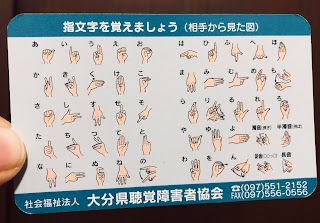How accessible is Beppu for travelers with special needs?
My dad had stroke 7 years ago, and still is on his way to recover, so he needs cane to support him walking. I am currently in my last month of pregnancy so I may not be able to walk too long, climbing stairs and have to use the restroom frequently (yes, no shame!) . Two of us travelled together with 7 other members of my family, including my husband, for a week around Beppu and Yufuin. My parents, my brothers and my sister in law flew from Indonesia to visit us here. So we planned everything accordingly. However, over the course of one week, we experienced traveling in a whole different level. The visit of my family gets me to think, how accessible Beppu really is for people with special needs.
1. Accessible Toilet - Location matters!
Sometimes when we think of travelers with special needs or with disability, we tend to think of ramp and accessibility for wheelchair users. However, after traveling with my dad, I realize it is more than that.
My dad walks using cane, thus he may walk slower than all of us, but telling him to be in wheelchair (which some places provide for free) for the sake of making our pace faster, may hurt his feelings. He might have said no to sightseeing if he thinks he is a burden to the group.
I also realized that I walked slower with my big belly, and may have slowed down the group. Luckily, my family was making sure that no one gets left behind.
Unfortunately, there are tourist spots in Beppu that, although they have restrooms for people with disability, they placed the toilet far from the attraction, or in a higher up place that requires more (vertical) walking.
Umi Jigoku was one example. Before, I never realized how the toilet is located up in a hill-like area and that we need to climb up a slope. After traveling with my dad and both of us wanted to use the restroom, we searched and found how cumbersome it is just to go to the loo. Therefore, in this case, I think accessibility is not only about the facilities themselves, but also the location of essential facilities like restrooms, especially in famous tourist spots in Beppu.
2. Taxi is our friend (if you have phone)
I love walking. Living in the central of Beppu, my husband and I often walk to the station, to eat out or to do our groceries. However, through this trip we realized that it would be difficult for my dad to walk around with cane, even if it is just to go to the bus stop 300 meters away from home.
Thus, we used cab a lot. That is more expensive than bus, but since there are 8 of us, sometimes we hailed 2 cabs, sometimes we only called 1 for my parents and I. The rest of the group can walk home.
Taxi is easy to get in Beppu, especially if you have phone to call them. So that is not a problem. Although, sometimes they are very hard to find during peak hours (and last week I saw many tourists flocking to Beppu, so I understand that the supply may not match the demand). If you do not have Japanese phones, hotels usually kindly help you by calling taxi themselves.
However, since we are talking about accessibility, I think it might be great to think of other alternatives of transportation mode that can be accessible for people with special needs.
How about Uber? The price can be more competitive than taxi and can be booked with internet. Unfortunately, we do not have that in Beppu. Renting a car may also be another alternative if you have international license. However, for my family, none of us have it, so taxi really is our best option.
But, thanks to many friends in Beppu, at the end of the day, we experienced the real Japanese “omotenashi”!
Japanese concept of omotenashi or hospitality was really felt throughout the whole trip. From a very thoughtful jumbo taxi driver that brought a small stool to help my dad got off the car, to the local kimono shop owner that cleaned up her elevator so that my dad and I did not have to climb up the stairs to her kimono workshop, we saw how everyone wanted to make sure that each one of my family members could enjoy Beppu.
Our heart-felt gratitude goes to friends such as Abe san from City Hall and Kajiwara sensei who kindly helped us to move around in Beppu freely. They also recommended us places to have onsen for free or halal food to enjoy. Really, they are the best!
At the end of the day, Beppu is home to many people, with and without special needs. There are still things to improve but as an Indonesian, I can say that my country needs to learn from this small hot spring town. Afterall, accessibility is not only about creating facilities for people with disability, but is also about opening your heart and making sure that everyone feels welcomed.






Comments